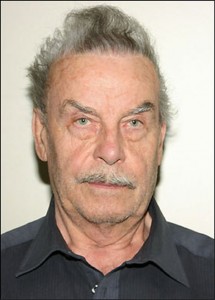ST POELTEN, Austria (Reuters) – An Austrian man who fathered seven children with a daughter he held in a cellar for 24 years pleaded guilty to incest yesterday but denied murdering their newborn son and enslaving her.

Wearing a mismatched grey suit, Josef Fritzl, 73, entered court in St Poelten, near Vienna, flanked by six policemen and concealing his face behind a blue loose-leaf binder.
He later lowered the folder and with his back to the gallery spoke softly, sometimes mumbling, in response to questions about personal details and his plea. Fritzl looked straight ahead or at his lawyer, not at the jury or prosecutor.
Prosecutors accused Fritzl of raping his daughter in front of captive children. They said Fritzl, who faces life in prison if convicted, was responsible for the death of a twin who died shortly after being born in the cellar in 1996.
They said this was murder by neglect because Fritzl failed to seek help for the baby, whose body he burned in a furnace.
Prompted by the judge several times, Fritzl pleaded “partially” guilty to rape and said he was guilty of depriving the children who were kept underground of their liberty. Austrian law differentiates between the severity of rapes and levels of coercion, and takes into account the degree of violence used and the consequences for the victim. Fritzl’s lawyer will clarify which part of the rape charges he denies during the closed-door part of the trial this week, said court spokesman Franz Cutka. In theory, Cutka said, Fritzl could plead guilty to the rape charge in general but dispute the prosecution’s claims as to the degree of violence he used.
Fritzl also pleaded innocent to a charge of enslaving his daughter Elisabeth, now 42, for most of her life.
“He shut (Elisabeth) away in the cellar and made her totally dependent on him, forcing her into sexual acts and treating her as if she was his own property,” his charge sheet read.
The jury, which watched part of an 11-hour pre-recorded video statement by Elisabeth yesterday, were expected to reach a verdict by the end of the week.
“In prison he behaved quite normally, he is not a special person,” deputy prison director Erich Huber-Guensthofer told a news conference. “If he were in this room no one would pay any attention to him. He keeps to the rules and is polite.”
Fritzl, a retired engineer, built the soundproofed cellar with a reinforced door under his home in the town of Amstetten.
In her opening statement at the trial, prosecutor Christiane Burkheiser said that during the early years of her captivity, Elisabeth had no hot water, shower or heating.
It was sometimes so hot that condensation dripped down the walls, she told the jury, depicting the size of Elisabeth’s initial 11-square-meter living space with her hands. It was later expanded to 60 square meters to accommodate the children.
Defense lawyer Rudolf Mayer said the charge of enslavement was inappropriate. He described how Fritzl “brought up a second family” and criticized his media portrayal as a “monster,” urging the jury to set emotions aside to enable a fair trial. He said Fritzl showed concern for the children’s welfare by taking some of them out of the cellar and his seriously ill daughter, Kerstin, 19, to hospital. She had never seen daylight and her hospital trip led to Fritzl’s arrest in April last year.
If convicted of murder, Fritzl could receive a life sentence or up to 15 years in prison. Mayer said Fritzl expected to spend the rest of his life locked up, probably in a mental institution.
“Provided he makes good progress, there could be an early conditional release from this institution,” court spokesman Cutka said. “In any case this could only happen after he has served half of his term.”
Fritzl’s daughter and her six children, three of whom were incarcerated from birth, are now living in a secret location under new identities.
Three of the children were raised above ground by Fritzl and his wife Rosemarie after he pretended Elisabeth had abandoned them. Police say Rosemarie did not know of his actions.





